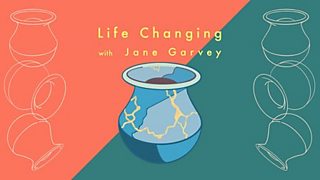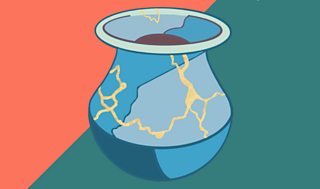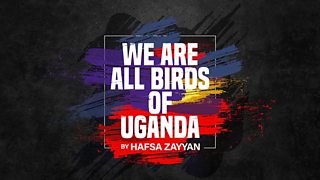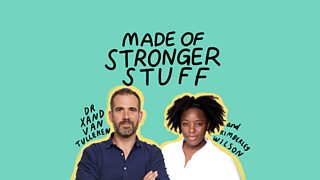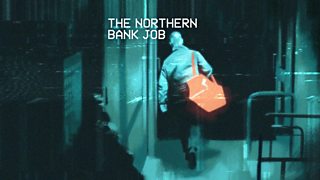I stole â¬1.75 million to fund my gambling addiction
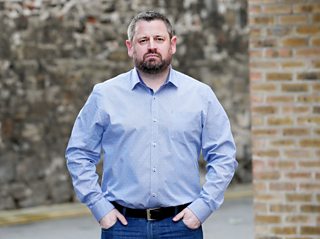
Tony O’Reilly remembers the first bet he ever placed. It was 1998, and Tony was a 24-year-old living in Carlow, Ireland, when the nation was gripped by World Cup fever. He and a friend placed a £1 bet on the Netherlands v Argentina game. Why not, after all, it was only £1?
Yet this seemingly harmless act triggered such a severe addiction that, 12 years later, Tony would be financially ruined, reliant on theft, and on the run from the law.
In Radio 4's Life Changing, Jane Garvey hears from those who have lived through extraordinary events. Here’s Tony’s story.
-
![]()
Listen to Life Changing with Jane Garvey
Jane Garvey talks to Tony OâReilly about the time he was forced to confront his spiralling addiction.
âIâm brilliant at this.â
Tony’s first bet was an ambitious one: that Patrick Kluivert would score first and the Netherlands would win 2-1 in the World Cup quarter-finals. After placing it, he and his friend returned to the bar where Tony worked to watch the match unfold. With skin in the game, the match took on a whole new level of significance.
He recalls: “It was a different feeling than I would have had before watching a match. We had told everyone in the bar the bet that was going on, and it was like the whole bar was with us. I went out that night and we re-enacted the goal using lemons from behind the bar.
"It was that chest-puffed-out ego thing of ‘I’m brilliant at this.’” From his £1 bet Tony won £45, which was equivalent to nearly half a week of his wages. “I remember going to bed that night thinking, ‘this is easy, this is an easy way to make money. I’m good at this.’”

All under controlâ¦
For the next four years, Tony continued to gamble, but was careful to stay within his means. Gambling became the highlight of his weekend, and he wasn’t alone in this. He now had a job with An Post, Ireland’s postal service, and his colleagues were keen followers of horse racing. He picked up tips and started placing bets of a few euros on the horses.
Tony grafted hard at his post office job in the town of Gorey, enrolling with a night college to study business on the side. By 2009 he was Ireland’s youngest An Post branch manager. “Everything from the outside looked really, really good, but simmering underneath was this addiction that was growing.” Hindsight is a wonderful thing, though, and at the time, Tony wasn’t aware that he had a problem.
The cycle of debt
A wedding may well be the happiest day of someone’s life, but the lead up is often costly and stressful. Tony felt this more keenly than most because his gambling habit had now left him in debt. Far from excited, he was permanently preoccupied with how to settle up. “I was supposed to have the balance of the wedding, about €6,000, on my credit card. A couple of weeks coming up to the wedding, the balance of my credit card was near enough to zero. I [had been] gambling really heavily trying to win this €6,000 that I was supposed to have saved. So I went to my bank and asked them for a top up, like I had done numerous times previously.”

But having maxed out his credit card already, Tony’s request was declined. As the panic set in, his fiancée’s father phoned and offered to foot the bill for the wedding as a gift. While his fiancée was reluctant, Tony persuaded her that they should accept the generous offer. “I was manipulating the situation because I knew, financially, how bad we were.”
With the wedding taken care of, they flew to Cyprus for the main event. Finally, Tony could relax and look forward to the company of 82 of his family and friends, and “the romance of it all”. With no smartphone of his own, and two weeks away from his laptop, Tony planned to have a break from the gambling. But as he was heading to bed, he spotted a computer in the hotel foyer, and his mind changed. “Maybe I could have one or two little bets?” he reasoned. “Before I knew it, I had lost €1,000. Then the chase element came in and there was €2,000 gone.” With two days to go until the wedding, Tony had gambled away all of the money they’d been gifted.
âYou become a master of disguiseâ
Tony explains that he was able to lead a double life, whereby on the outside everything looked fine and on the inside he was falling apart. “You have to keep it together, because that’s the whole insidious nature of the issue. Your one belief is that you can gamble your way out.” He’d done it before and reasoned he could do it again.
You shouldnât have to wait for a horse to win a race to pay for a wedding.
In a perverse twist of fate, that’s just what happened. Tony remembered that he’d placed a four-part accumulator bet, the final part of which was on the Epsom Derby. The race was televised and he watched it on tenterhooks from his hotel bed, while his wife got ready to go out. Frankie Dettori was riding a horse called Authorized, and Tony bet on them to win – which they did. “My heart was about to jump out of my chest during the whole race. I went into the toilet and I nearly bit my fist screaming out of pure relief. With that bet coming in, it meant that I was due to win about €6,000.”
For the rest of the holiday, he was able to resist placing any more bets. He remembers reflecting: “This isn’t right, you shouldn’t have to wait for a horse to win a race to pay for a wedding.”
âYou try to fix it with the same means that got you into trouble in the first place.â
The debt, however, was still there, and Tony’s wife believed that they still had the €6,000 of savings put aside that her father’s gift should have spared them.

Tony’s role as Branch Manager meant that he was in charge of the post office’s finances, and this was no insignificant amount. There were hundreds of thousands of euros in cash stored in safes in his branch. Though there were occasional audits throughout the year, Tony was primarily in control: he had the keys to the safes.
By now, the couple had a baby on the way, and looking after the baby would leave his wife reliant on money from social welfare, leaving them an income down. On top of this, and unbeknownst to his wife, a lot of Tony’s income was tied up in loan repayments to settle the debt he had accrued. The pressure mounted, and this was when he rationalised his next actions: “That’s when I started to steal.”
“It went totally against my values”
Eyeing up the safes at work, Tony wondered whether he could borrow €100 or so and then win more back. But the amounts grew and grew, and he needed to balance the books at the post office. In desperation, he persuaded his mum to take out a loan of €8,000 – convincing her they needed the money to supplement his wife’s maternity leave. Yet before he could pay the money in the following morning, the auditors arrived at his workplace. When they didn’t notice the missing cash, Tony reasoned that perhaps he could use his mum’s cheque to win back more money.
âThat started a whole snowball effectâ
As his debts spiralled, Tony thought about opening up to his best friend and his dad, but never did. Bearing the whole weight of the situation on his shoulders was too much for him. “In the mornings she [his wife] was getting sick with morning sickness, I was in the other bathroom dry-retching with stress. My whole day was full of worry. The only way I knew how to fix it was to gamble.”
His daughter’s birth was the proudest day of his life, but it made clear the gravity of his situation. “It was tinged with sadness because I knew what kind of trouble I was in.” He had stolen €68,000.
In the space of a day, he placed 31 bets, 30 of which lost.
Tony returned from paternity leave just in time for the Christmas audit. His situation was so out of control that he was haphazardly amending the balance sheets. “I had stolen up to €294,000 within the space of a couple of weeks.” Yet the auditors left and he wasn’t caught. “That’s when I believe I really lost my mind.” In the space of one weekend, he started off with €5000 and turned it into nearly half a million euros.
His addiction was so severe that he would prop his laptop up on the car seat next to him and gamble on his drive into work. Having now stolen €900,000, he arrived at work determined that he could double the €462,000 in his online account and “fix the situation.” In the space of a day, he placed 31 bets, 30 of which lost – and with them the entire balance of his online account.
Tony’s luck ran out in June, six months after his narrow escape, when a colleague called to let him know that a surprise audit was taking place. He had stolen €1.75 million. “I got into the car and drove as fast as I could out of Gorey. I nearly crashed the car. I didn’t know where I was going, what I was going to do. I took apart my mobile phone and threw out the sim card. I drove as fast and as far away as I could, and I ended up in Belfast.”
The hotels in Belfast required proof of ID, and, unwilling to hand over his passport, Tony drove to Carrickfergus, finding an hotel where he could remain anonymous. And even then, Tony continued to gamble on absolutely anything he could.
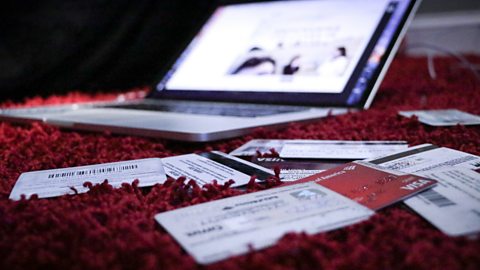
"Thatâs when I believe I really lost my mind..."
Tony O' Reilly gambled online in his car, trying to replace the â¬1.75m he had stolen.
âI got caughtâ
“I wasn’t in a good headspace when I was finally discovered,” Tony remembers. “I arrived down to the bookie office at about 2 o’clock and I was going through the papers. I saw the picture of Gorey Post Office, and the news had broken in Ireland, because I’d been seen leaving the Paddy Power office the night before. One line really resonated with me, it said ‘family and friends are looking for him in the Wicklow mountains.’ My family thought I had taken my own life.”
âThe relief I got that day, Iâll never forget it... I donât have to carry this anymore.â
That day, Tony placed his final ever bet. He went back to the hotel, drew the curtains, and began emailing his family to apologise. He contemplated taking his own life. “I couldn’t see any other way out. The one thing that stopped me was my daughter. I couldn’t leave her with questions unanswered.” In the meantime, his family had contacted the PSNI (Police Service of Northern Ireland), and at 5.30pm he was found.
“A knock came at the door, and there were two PSNI officers with guns. One went down and told my family that they’d found me safe and sound and the other one stepped into the room and said, ‘We’re not here to arrest you. We’re only concerned for your safety.’” Tony collapsed onto the bed. “The relief I got that day, I’ll never forget it.” He knew that he would face serious repercussions including a prison sentence, but his abiding thought was, “I don’t have to carry this anymore.”
Tony says he is “still haunted” by the look of disappointment he saw on his mother’s face when he arrived home. He received a prison sentence, lost his house, relationships, his marriage and self-respect. Even today, it still pains him to think what his family went through.
Tony was given treatment and was sentenced to four years in prison, with a year suspended. He wonders if he should have got a longer sentence. He didn’t, however, because he could prove that he benefitted in no way financially from the theft. “I was still driving the banged-up car, I hadn’t gone on holidays, and I still have loans. I’m still paying off those loans today. I’m still dealing with some of the consequences, but it helps me in my recovery.” He used his time in prison to re-educate himself and study to become a psychotherapist. He currently works as a gambling addiction counsellor.
Sadly, Tony’s mum died shortly after he left prison, before he could show her all he’s achieved. When he went to say his final goodbyes, he apologised to his mum again. Tony remembers her reply: “Typical my mam, she said: ‘I forgive you Tony. But it was big, wasn’t it?’ That was the last words she said to me.” His driving force has been to use his experience to help others, and he believes his mum would be very proud of him. After everything, he still has one great concern: his daughter. “I’ve dealt with lots of adversity over the years, but I’m dreading that conversation more than anything else when I have to say: ‘This is what your Daddy done [sic], this is what your Daddy became. That’s one of the reasons for my recovery. I want to be able to turn around to her, whenever I tell her, and be able to say ‘Yes, I did make a mistake, yes I did mess up, but this is what I’ve done since. This is the person I’ve become.’”
-
![]()
´óÏó´«Ã½ Action Line
Information and support for issues covered in Life Changing.

Powerful stories on Radio 4
-
![]()
We Are All Birds Of Uganda
Themes of romance and exile combine with a stunning portrayal of modern Uganda as a young man tries to find his place in the world.
-
![]()
Made of Stronger Stuff
Kimberley Wilson and Xand van Tulleken ask - one body part at a time - how can we change?
-
![]()
The Northern Bank Job
It was the biggest bank heist in British and Irish criminal history. Belfast writer Glenn Patterson has unfinished business with the 2004 Northern Bank robbery.
-
![]()
Just One Thing: Eat Some Bacteria
How making fermented foods part of your daily diet could help weight loss, reduce inflammation and even improve your mental health.
